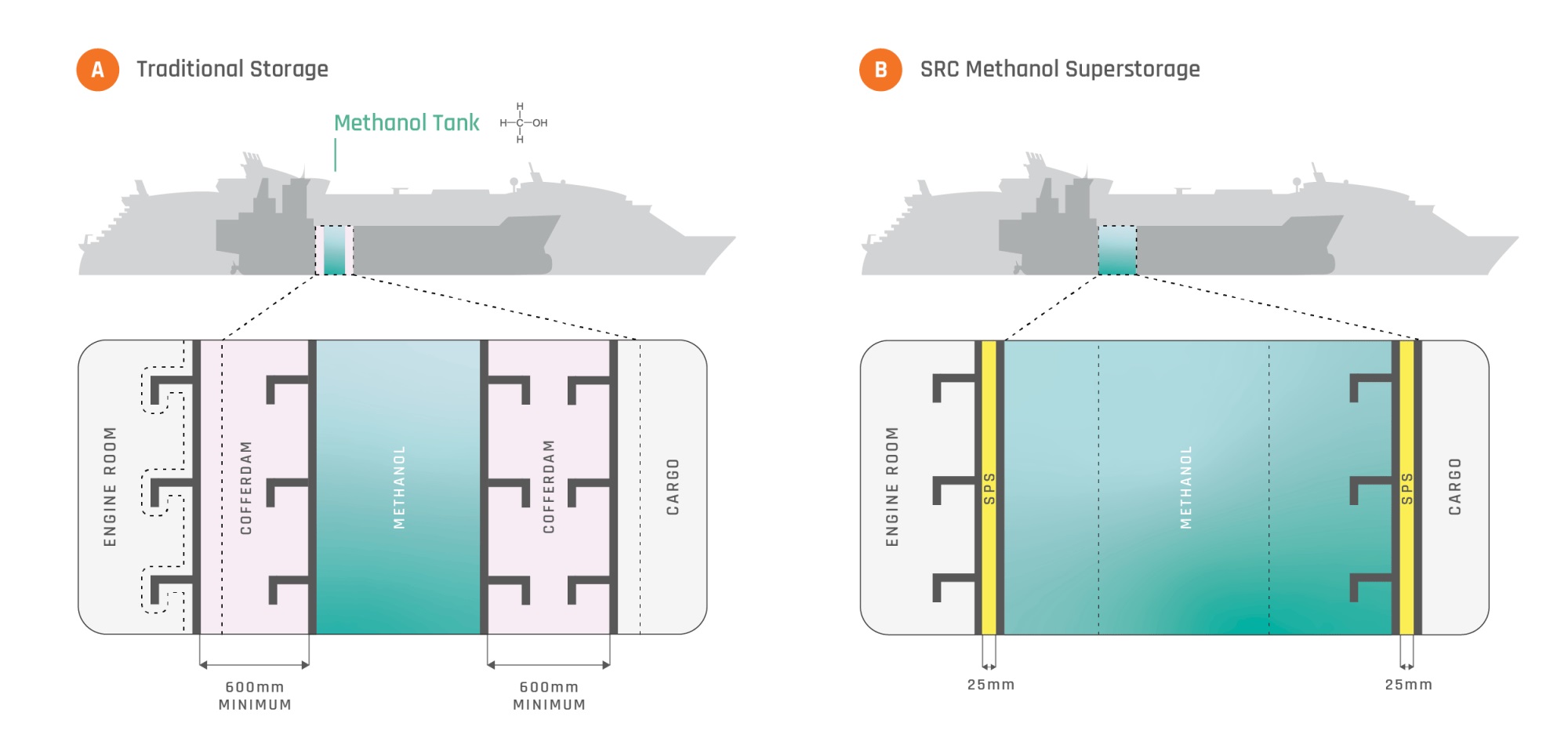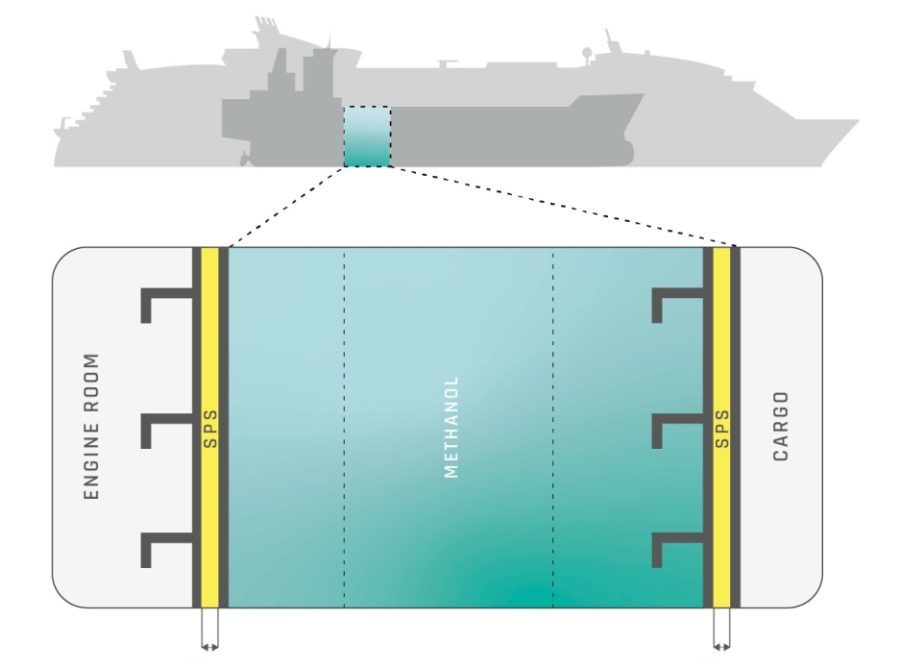Whether or not methanol should prove to be the winner (or one of them) in the great rush towards cleaner fuels is one of many questions unlikely to become apparent for a number of years yet. What is clear is that many shipowners are already prepared to hedge their bets. Over the summer Maersk, whose pro-CH3OH stance has been abundantly clear from its newbuilding programme, announced that it was in discussions with potential shipyards about converting an in-service container ship for dual-fuel capability.
Not wanting to be left out, rival boxship operators Seaspan and Hapag-Lloyd were also revealed to be in discussions with MAN Energy Solutions about converting a combined 15 engines to methanol capability, with an option for a further combined 45. According to market analysts Clarksons some 1,200 ships could be methanol powered by the end of the decade.
But there’s a problem. As a low flashpoint fuel methanol is subject to the more stringent fire precautions of the IGF Code, in particular the installation of cofferdams of up to 600mm thickness to mitigate the spread of any conflagration. Given that methanol’s lower energy density – less than half that of HFO – already necessitates carrying significantly more fuel, the resultant loss of further fuel storage space begins to create a challenge.
Methanol Superstorage
But a solution could be at hand according to SRC Group, an engineering, procurement, construction and installation supplier headquartered in Estonia but with offices across Europe, the US and Asia with a strong emphasis on refits. Currently in a scale-up phase the company offers knowledge-related services and innovative solutions to a variety of high-profile clients in maritime and offshore, among them Carnival Corporation, Maersk Supply Services and ABB.
SRC Group recently received Approval in Principle (AiP) from Lloyd’s Register (LR) for Methanol Superstorage, which negates the cofferdam obstacle by instead constructing tank walls made of composite Sandwich Plate System (SPS) technology. According to SRC, its solution can boost methanol storage volume by as much as 85% and be retrofitted with minimal impact to a ship’s general arrangement.
Esa Häkkinen, SRC’s head of design, says the story of Methanol Superstorage’s development began in the middle of last year while conducting a feasibility study for a major cruise operator. He explains: “We’ve been working together for more than 15 years with SPS Technologies, a producer of sandwich panels that are normally used for ship repairs, vibration dampening and additional impact strength.
“We started to investigate if that same SPS technology could be utilised in methanol storage tanks so we can get rid of the cofferdams which is the main challenge with refits. Newbuildings are a different matter because you can accommodate within the general arrangement with existing regulations.”
SPS is already approved as a permanent repair method by most classification societies, having been subjected to extensive testing for fire and chemical resistance. The investigation team first ensured that an SPS panel could meet the functional requirements for the proposed usage before contacting LR, which they had previously worked closely with in other applications of the composite. With LR’s assistance SPS began the five-step risk-based certification process, limited specifically to the tank structures.
The first two steps – the designer safety statement and the risk assessment – were completed earlier this year, together with the preliminary appraisal of rules template. Based on these findings LR granted the AiP over the summer. Because SOLAS Chapter II-1 Part F defines a goal-based approach, with low-flashpoint fuels specifically referenced as suitable for alternative designs, there is scope for the solution within existing regulatory tools without the need for amendments.

With regard to container ships the original example vessel achieved a 42% increase, although an arrangement where fuel tanks are positioned between the cargo base would yield gains closer to 60%.
Subsequent research found that vessels which already have a limited fuel capacity, such as supply ships and superyachts, also record significant improvements. In the case of bulk carriers and tankers retrofitting was generally not considered cost effective compared to simply ordering new vessels.
Cost benefits
In capex terms retrofitting with Methanol Superstorage compares favourably with a cofferdam arrangement, according to Hannes Lilp, SRC Group’s chairman and CEO. “We’re adding less steel weight and although we’re adding this polymer in between instead the cost would be in a similar range. There are also opex benefits later on with maintenance and the inspection needs for cofferdams.”
Häkkinen adds: “The sandwich arrangement is lighter, weight wise, and quite light in density. So we don’t need to have additional stiffeners for the second plate or frames for the cofferdams. Retrofits will also require fewer modifications to arrangements and keep the functionality of the ship’s cargo areas intact.”
A similar solution could even be viable for other alternative fuels, with Häkkinen indicating that SRC is currently investigating the feasibility of its use to store ammonia, . “There are challenges in applying it to ammonia, but we are exploring all the possibilities where an invention like this could be utilised in the future,” says.
The team is also keen to point out that the technology is by no means restricted to retrofits. “Although as a company we are mostly focused on retrofits it extends to newbuilds as well. Even the classification societies we’ve been in contact with don’t see a competitive solution like it today,” says Alex Vainokivi, SRC Group’s innovation manager.
Lilp says that since the solution was announced at the beginning of October the levels of interest from potential clients in Methanol Superstorage has surpassed even what SRC had been anticipating.
“Every day our sales team is holding many meetings related to Methanol Superstorage, ranging from naval architects up to shipowners and builders from around the world including South Korea, China, Europe and America. We are seeing really big interest.”






